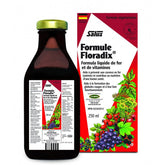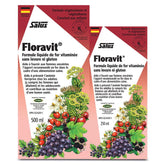Anemia and iron deficiency... let's talk!
Updated on 2025-10-14
Summary: Anemia and iron deficiency... let's talk!
Iron deficiency often precedes anemia, a condition in which the blood contains fewer red blood cells or hemoglobin, reducing oxygen intake and causing fatigue, shortness of breath, paleness, headaches or difficulty concentrating. Diagnosis requires a blood test to measure hemoglobin and ferritin.
To correct or prevent a deficiency, we rely on an iron-rich diet (meats, seafood, lentils, green vegetables, nuts, seeds) combined with vitamin C (citrus fruits, strawberries, broccoli...) to promote absorption. If necessary, supplements are available, such as Floradix or Floravit from Salus.
1. Iron deficiency vs. anemia
Iron deficiency occurs when iron stores are too low, reducing the production of red blood cells and hemoglobin. If left uncorrected, it can lead to anemia, a condition where the blood carries less oxygen, resulting in reduced energy.
2. Symptoms to watch out for
Common signs include persistent fatigue, pale skin, shortness of breath on exertion, headaches and difficulty concentrating. A blood test measuring hemoglobin and ferritin helps confirm the diagnosis.
3. Feeding and absorption
To maintain a good iron level, opt for meats, seafood, lentils, green vegetables, nuts and seeds. Absorption is enhanced by vitamin C (citrus fruits, strawberries, kiwis, broccoli, kale, etc.), which should be consumed at the same time.
4. Supplementation as needed
If a deficiency is confirmed, a doctor may recommend iron supplements, such as Floradix or Floravit from Salus to be taken between meals. These vitamin-enriched formulas help restore iron reserves effectively.
About the author
Lynn Goneau, Certified Naturopath
Specialized in :
- Digestive health
- Hormonal health
- Stress and fatigue
- Memory and concentration
- Weight management
Frédéric Bisson, radio host at 104.7 FM
Host of the 104.7 FM radio station on the Cogeco network. Frédéric Bisson has hosted L'Outaouais Maintenant from 3 to 5 p.m. every weekday since February 27, 2023.
Transcription
Frédéric Bisson - Host 104.7FM:
This week, Lynn Goneau of La Boîte à Grains talks about anemia and iron deficiency. According to the World Health Organization, anemia affects about 25% of the population. So what is anemia? What is iron deficiency? Hello Lynn Goneau.
Lynn Goneau - Naturopath of La Boite à Grains:
Hello Fred.
Frédéric Bisson - Host 104.7FM:
There's a fundamental difference between the two.
Lynn Goneau - Naturopath of La Boite à Grains:
Yes, it's important to understand. Iron deficiency occurs when your body's iron reserves are depleted. When iron is lacking, the production of red blood cells and hemoglobin decreases, often leading to anemia.
Frédéric Bisson - Host 104.7FM: Ah ok, it happens before the anemia.
Lynn Goneau - Naturopath of La Boite à Grains:
Exactly. So anemia is a situation where the blood contains fewer red blood cells or hemoglobin. That's the protein that carries oxygen from the lungs to the body's cells. So it's really what gives you your energy.
Frédéric Bisson - Host 104.7FM:
Yes, because otherwise, not enough oxygen gets through. So there are symptoms you need to look out for. Uh, you have to watch out for certain symptoms, Lynn, and iron deficiency. We don't talk about all that every day. Here. It's important to pay attention.
Lynn Goneau - Naturopath of La Boite à Grains:
Yes indeed, there are symptoms that can include fatigue or simply a lack of energy. It could be pale skin. Or shortness of breath, even on exertion. We see this sometimes, people go up the stairs and then have difficulty, they get to the top, then they're out of breath.
Frédéric Bisson - Host 104.7FM:
All because there aren't enough red blood cells to carry oxygen to the body.
Lynn Goneau - Naturopath of La Boite à Grains:
Exactly. It could be headaches. It could be difficulty concentrating. It can be something else too. But you have to consider that these could be signs of iron deficiency. But it's very important to consult a doctor who can confirm the diagnosis with a blood test. This will measure your hemoglobin and ferritin levels. These are your iron deficiency markers.
And when you have an easy test like this, it's important to use it, to ask doctors to prescribe a blood test.
Frédéric Bisson - Host 104.7FM:
So if you have either a deficiency or anemia, generally the treatment looks like what?
Lynn Goneau - Naturopath of La Boite à Grains:
Treatment will usually involve iron supplementation or simply an iron-rich diet to restore acceptable levels in your body. So it's important to include foods that are also rich in vitamin C, because it's vitamin C that will help your iron absorption.
Frédéric Bisson - Host 104.7FM:
Interesting. So if you want to make sure you don't run out, what foods are rich in iron?
Lynn Goneau - Naturopath of La Boite à Grains:
There are foods like red meat, white meat and poultry livers. We're not inclined to eat them, but there are plenty.
Frédéric Bisson - Host 104.7FM:
In a nice little chicken liver pâté.
Lynn Goneau - Naturopath of La Boite à Grains:
Yes, indeed.
Frédéric Bisson - Host 104.7FM:
It's in seafood.
Lynn Goneau - Naturopath of La Boite à Grains:
Yes. In seafood, lentils, green vegetables like spinach and Swiss chard. Cabbage too. Then nuts and grains like cashews, pistachios, almonds, pumpkin seeds. It's so easy. It's so easy to add to our diet.
Frédéric Bisson - Host 104.7FM: Basically, every time you do a column, nuts come up almost all the time. That's how complete a food they are.
Lynn Goneau - Naturopath of La Boite à Grains:
We agree that this is a nut that is not roasted and not salted.
Frédéric Bisson - Host 104.7FM:
I know what you mean. It's important. So you were talking about vitamin C earlier, because no matter how much iron you take, if you don't have vitamin C with it...
Lynn Goneau - Naturopath of La Boite à Grains:
Iron is less easy to absorb. It's less easily absorbed. So we can talk about foods like citrus fruits, oranges, lemons, fruits like strawberries and kiwis, or even mangoes. As well as vegetables such as parsley, broccoli, Brussels sprouts, even leafy greens like kale. So kale falls into both categories, as it's a good source of iron and also a good source of vitamin C.
Frédéric Bisson - Host 104.7FM:
There are iron supplements too. They do exist.
Lynn Goneau - Naturopath of La Boite à Grains:
Indeed, if the doctor recommends you take either a syrup or a tablet, but it's very ideal to take it outside of meals, not to take it with a meal. There's one in particular, or in fact two, from the Salus company: Floradix and Floravit. These are iron formulas with vitamins. The Salus company was founded in 1916 and has become a world leader. Floradix is the original vitamin-enriched iron formula, while Floravit is a gluten-free, yeast-free version.












